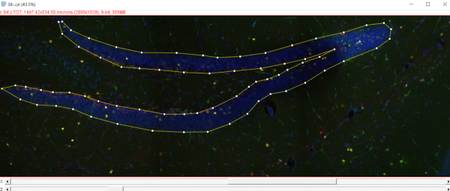As my summer project, I investigated the effect of anaesthetics on a generation of new neurons in the brain. Several studies have indicated that exposure to anaesthesia during a vulnerable window after birth may affect the brain in ways that can last even into adulthood. My project focused on an area of the brain called the dentate gyrus which is a part of the hippocampus, a brain area associated with learning and memory. The anaesthetic focused on was isoflurane, a volatile anaesthetic often used in the induction and maintenance of anaesthesia. The hypothesis was, that exposure to isoflurane shortly after birth, could disturb the formation of neural stem cells in the dentate gyrus later in life, which may lead to deficits in learning and memory.
To investigate whether this might be the case, my job was quite simple: to count the neural stem cells in the dentate gyri of isoflurane-treated and control brains. To do this, I used an image processing software called Fiji, which allows for visualisation of different cell types. (image here) The different colours visualise different “channels” in the image, which represent different staining molecules. These stains are used to visualise specific markers on cells. This helps to distinguish between all the different types of cells in the dentate gyrus. The yellow lines are measuring the area of the dentate gyrus, so the number of cells can be normalised for area.
The counting was done blind to avoid any bias, so I did not know which of the images I was looking at were from the control group and which from the isoflurane group. Once all the images had been counted, I received a key to see which files were control and which ones were not. Then it was a matter of grouping the data into different control and isoflurane-treated groups and doing some calculations. This included some simple statistics, as well as variance analysis to compare the two groups.
The data of the experiment unfortunately did not prove to be significantly different between the two groups. This was a bit disappointing, but that is what research is sometimes like. Although I would have hoped to uncover something a bit more exciting, the project has still been an incredibly valuable experience, and there is a lot I can take away from it. I learned some new research skills, met some other researchers, and got a taste of what the life of a researcher is, as well as to deep dive into a topic I had not encountered a lot before. Getting to do actual research (as opposed to pre-planned labs for example) has definitely been a refreshing and valuable experience, and this topic is something I might like to work with in the future as well!


